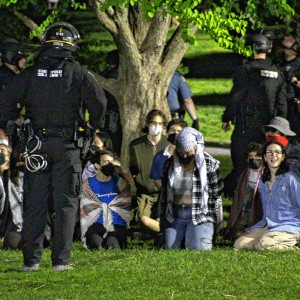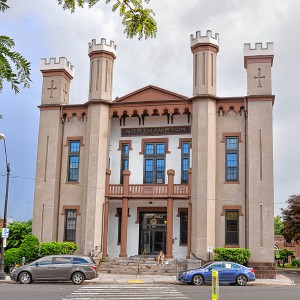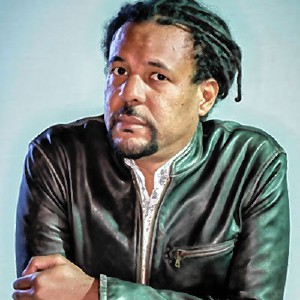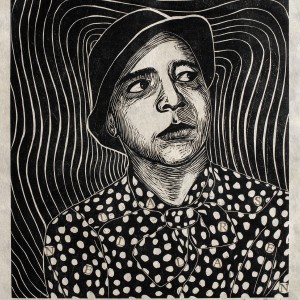The Soviet poet and the English sleuth: New play imagines Sherlock Holmes investigates the 1930 death of revolutionary poet and playwright Vladimir Mayakovsky
| Published: 07-13-2023 1:52 PM |
What do Vladimir Mayakovsky, a celebrated poet and playwright of the early years of the Soviet Union, and Sherlock Holmes have in common?
Pretty much nothing, it would seem – except both appear in “Hope I Die Before I Get Old,” a one-man play in which the famous fictional British detective investigates the mysterious death of Mayakovsky, who shot himself in 1930 at age 36 at a time when he faced growing criticism for alleged anti-Soviet themes in his writing.
“Hope I Die Before I Get Old,” which will be staged July 21 through 23 and 27 through 29 in the Blue Room at CitySpace in Easthampton, is the work of playwright and actor John Feffer, who, in addition to his theatrical side, has an extensive background in foreign affairs as a writer and policy analyst, particularly regarding Russia and Poland.
Feffer’s pretty new to the region; he and his wife moved to the Valley last year from the Washington, D.C. area, where Feffer directed the foreign policy division of the Institute for Policy Studies, a progressive think thank. (He and his wife relocated to be closer to family in Connecticut and southern Vermont.)
A former freelance journalist, as well as the author of fiction and nonfiction books, Feffer has written, performed and produced 11 previous theater works, including in Washington, New York, and Edinburgh, Scotland.
In a recent phone call, he said he first came across Mayakovsky’s work while studying Russian in Moscow in the 1980s and found both his writing and life story compelling.
“He was seen as kind of a patron saint of communism, but at the same time, he had deeply conflicted feelings about what was happening in his country as time went on,” said Feffer. “He was kind of a closet dissident.”
Mayakovsky, born in Georgia in 1893, was also a genuine rock star of his day, Feffer added, a guy who “broke all the rules and shocked people” with his radical poems and plays and public readings.
Article continues after...
Yesterday's Most Read Articles
 More than 130 arrested at pro-Palestinian protest at UMass
More than 130 arrested at pro-Palestinian protest at UMass
 ‘Knitting treasure’ of the Valley: Northampton Wools owner spreads passion for ancient pastime
‘Knitting treasure’ of the Valley: Northampton Wools owner spreads passion for ancient pastime
 UMass student group declares no confidence in chancellor
UMass student group declares no confidence in chancellor
 Guest columnist Josh Silver: Northampton school budget — Let’s start with kindness, accuracy and respect
Guest columnist Josh Silver: Northampton school budget — Let’s start with kindness, accuracy and respect
 With Jones project in question, Amherst won’t sign lease for temporary digs
With Jones project in question, Amherst won’t sign lease for temporary digs
 UMass graduation speaker Colson Whitehead pulls out over quashed campus protest
UMass graduation speaker Colson Whitehead pulls out over quashed campus protest
He also became an outspoken advocate for the Russian Revolution and was arrested three time as a teenager for anti-Czarist activities; he began writing poetry during one of his jail terms.
“His early poetry had a punk sensibility, if you will,” Feffer said. “He was brash and in your face, the kind of guy who would have destroyed his guitar on stage.”
Hence the title of the play, a line taken from The Who’s “My Generation,” a song written by Pete Townsend, who was known to smash a few guitars himself during some early Who gigs.
But following the Russian Revolution and the Bolshevik triumph in the Russian Civil War, Mayakovsky grew disillusioned with increasing state control and censorship of the arts, and later works in which he satirized or criticized Soviet bureaucracy faced blowback from state authorities and the country’s literary establishment.
That, along with some odd developments following his death, gave rise to dark theories that the poet had been murdered by Soviet authorities, though Feffer says he’s examined many of these stories and found them wanting.
“They might make for good theater, but they’re not the truth,” he said, noting that Mayakovsky had plenty of emotional turmoil in his life that likely contributed to his suicide – though he says it’s also an open question whether the writer, had he not taken his life, would have survived Stalin’s purges of the late 1930s.
Feffer adds that his play “is not a heavy trek through Russian history. It’s meant to be entertaining, to be fun, while still examining this issue of how writers and artists work within the confines of an authoritarian state.”
In fact, Feffer says it was Russia’s attack on Ukraine last year that prompted him to develop his play, given that Russian writers and artists today face the same problems Mayakovsky did in criticizing the government.
’Elementary, my dear Watson’
There’s still plenty of “real history” in the play, says Chris Rohmann, the former Valley Advocate theater writer who is directing “Hope I Die Before I Get Old.” But Rohmann also calls the production a “weird and wonderful play” that offers “some great back and forth that mixes comedy and tragedy really well.”
Sherlock Holmes, for example – where does he come in?
With a laugh, Feffer notes that the character created by English author Sir Arthur Conan Doyle first appeared in 1887, a few years before Mayakovsky’s birth, after which Doyle initially killed off the detective in a 1893 story, the year Mayakovsky was born. (Doyle would later resurrect Holmes for additional stories after readers clamored for more of him.)
Feffer also notes that Doyle died in July 1930, just a few months after Mayakovsky took his life.
“I used those links to create this conceit that Stalin himself calls Holmes in to find out why this giant figure of Soviet literature has killed himself,” he said.
The play begins with Feffer playing Holmes, coming out of retirement to investigate Mayakovsky’s death; he speculates at one point whether the poet “could hear the sound of the police van” coming to his home. Then Feffer takes on the role of Mayakovsky, who talks about the trajectory of his life and work.
“Hope I Die Before I Get Old” includes two other actors, Jarice Hanson and Hero Marguerite, who both appear in videotaped cameos. Hanson plays a Russian academic, Yelena, and Marguerite plays Lily Brik, a married Russian writer and socialite who became Mayakovsky’s lover and muse beginning around 1915.
“I needed to have some characters for Mayakovsky to play off, who could challenge him,” said Feffer, who interacts on stage with the actors’ spoken parts. “He had a powerful ego, so we needed some additional perspective.” (The two women’s parts were filmed so that he could take the show on the road, Feffer notes.)
Rohmann says he’s felt like a real collaborator with Feffer on the play, as the two have shared many ideas on both the script and the direction. “It’s a real partnership – each of us gets the last word,” he said with a laugh.
Another Valley theater veteran, Nikki Beck, has served as stage manager.
Rohmann notes that the play, despite its connections to Josef Stalin and his murderous regime, is centered on a portrait of Mayakovsky “and his life, where he wonders how his work will live on after his death.”
In fact, Feffer says, Mayakovsky remained a popular figure in the Soviet literary world after his death, though during Stalin’s rule any of his work considered anti-Soviet was censored. Beginning in the 1980s, more of his work was made public again in Russia, and Feffer says there’s been additional positive reevaluation of his writing both in Russia and the West in the last 15 years.
“He’s a fascinating figure, and I think he makes for good theater,” he said.
“Hope I Die Before I Get Old: The Last Case of Sherlock Holmes” will play at 8 p.m. in the Blue Room in CitySpace July 21, 22, and 27 through 29, and at 3 p.m. July 23. Tickets are $15 and can be purchased at cityspaceeasthampton.org.
Steve Pfarrer can be purchased at spfarrer@gazettenet.com.

 Overlooked no more: Leverett artist’s woodcut prints celebrate remarkable women of the past
Overlooked no more: Leverett artist’s woodcut prints celebrate remarkable women of the past Arts Briefs: Dance festival and a one-woman play in Northampton, summer music fests in Easthampton, and more
Arts Briefs: Dance festival and a one-woman play in Northampton, summer music fests in Easthampton, and more Speaking of Nature: Capturing my Bermuda nemesis: The Great Kiskadee nearly evaded me, until I followed its song
Speaking of Nature: Capturing my Bermuda nemesis: The Great Kiskadee nearly evaded me, until I followed its song Easthampton author Emily Nagoski has done the research: It’s OK to love your body
Easthampton author Emily Nagoski has done the research: It’s OK to love your body
